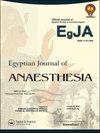D. M. Mohamed, Hagar Hassanein, Fahima M ElSharkawy, Sahar Elshal, A. Hussam
{"title":"新冠肺炎疫情对开罗大学医院麻醉住院医师培训的影响","authors":"D. M. Mohamed, Hagar Hassanein, Fahima M ElSharkawy, Sahar Elshal, A. Hussam","doi":"10.1080/11101849.2023.2203546","DOIUrl":null,"url":null,"abstract":"Background: The purpose of this study was to evaluate the impact of COVID-19 pandemic on the training process of anesthesia residents in Cairo University Hospital regarding technical skills, operative, and critical care experience. Method(s): This cross-sectional survey study included two groups of anesthesia residents according to the time of their residency in relation to the pandemic (before-pandemic group [N = 44] and during-pandemic group [N = 42]). The participants were asked to fill out a questionnaire regarding their training. The questionnaire included technical skills experience (regional anesthesia, vascular access, and advanced airway techniques, soft tissue ultrasound), operative and critical care experience, and duration of intensive care unit (ICU) rotation. The quality of training was graded as adequate, moderate, or deficient training according to the number of performed procedure/managed cases. Comparisons of continuous data were done using the Mann-Whitney test, and qualitative categorical was analyzed using the chi-square test. Result(s): All the participants completed the questionnaire. The training in the during-pandemic group was lesser than that in the before-pandemic group for most of the technical skills except for soft tissue ultrasound which was more in the during-pandemic group. The operative experience was less in the during-pandemic group than that in the before-pandemic group. On the other hand, the ICU experience was more in the during-pandemic group than that in the before-pandemic group. Conclusion(s): The COVID-19 pandemic disrupted the training program of anesthesiology residents with regard to elective procedures and produced over-training in critical care subspeciality.Copyright © 2023 The Author(s). Published by Informa UK Limited, trading as Taylor & Francis Group.","PeriodicalId":11437,"journal":{"name":"Egyptian Journal of Anaesthesia","volume":"1 1","pages":""},"PeriodicalIF":0.5000,"publicationDate":"2023-04-18","publicationTypes":"Journal Article","fieldsOfStudy":null,"isOpenAccess":false,"openAccessPdf":"","citationCount":"1","resultStr":"{\"title\":\"Impact of COVID-19 pandemic on anesthesia resident’s training program in Cairo University Hospital\",\"authors\":\"D. M. Mohamed, Hagar Hassanein, Fahima M ElSharkawy, Sahar Elshal, A. Hussam\",\"doi\":\"10.1080/11101849.2023.2203546\",\"DOIUrl\":null,\"url\":null,\"abstract\":\"Background: The purpose of this study was to evaluate the impact of COVID-19 pandemic on the training process of anesthesia residents in Cairo University Hospital regarding technical skills, operative, and critical care experience. Method(s): This cross-sectional survey study included two groups of anesthesia residents according to the time of their residency in relation to the pandemic (before-pandemic group [N = 44] and during-pandemic group [N = 42]). The participants were asked to fill out a questionnaire regarding their training. The questionnaire included technical skills experience (regional anesthesia, vascular access, and advanced airway techniques, soft tissue ultrasound), operative and critical care experience, and duration of intensive care unit (ICU) rotation. The quality of training was graded as adequate, moderate, or deficient training according to the number of performed procedure/managed cases. Comparisons of continuous data were done using the Mann-Whitney test, and qualitative categorical was analyzed using the chi-square test. Result(s): All the participants completed the questionnaire. The training in the during-pandemic group was lesser than that in the before-pandemic group for most of the technical skills except for soft tissue ultrasound which was more in the during-pandemic group. The operative experience was less in the during-pandemic group than that in the before-pandemic group. On the other hand, the ICU experience was more in the during-pandemic group than that in the before-pandemic group. Conclusion(s): The COVID-19 pandemic disrupted the training program of anesthesiology residents with regard to elective procedures and produced over-training in critical care subspeciality.Copyright © 2023 The Author(s). Published by Informa UK Limited, trading as Taylor & Francis Group.\",\"PeriodicalId\":11437,\"journal\":{\"name\":\"Egyptian Journal of Anaesthesia\",\"volume\":\"1 1\",\"pages\":\"\"},\"PeriodicalIF\":0.5000,\"publicationDate\":\"2023-04-18\",\"publicationTypes\":\"Journal Article\",\"fieldsOfStudy\":null,\"isOpenAccess\":false,\"openAccessPdf\":\"\",\"citationCount\":\"1\",\"resultStr\":null,\"platform\":\"Semanticscholar\",\"paperid\":null,\"PeriodicalName\":\"Egyptian Journal of Anaesthesia\",\"FirstCategoryId\":\"1085\",\"ListUrlMain\":\"https://doi.org/10.1080/11101849.2023.2203546\",\"RegionNum\":0,\"RegionCategory\":null,\"ArticlePicture\":[],\"TitleCN\":null,\"AbstractTextCN\":null,\"PMCID\":null,\"EPubDate\":\"\",\"PubModel\":\"\",\"JCR\":\"Q3\",\"JCRName\":\"ANESTHESIOLOGY\",\"Score\":null,\"Total\":0}","platform":"Semanticscholar","paperid":null,"PeriodicalName":"Egyptian Journal of Anaesthesia","FirstCategoryId":"1085","ListUrlMain":"https://doi.org/10.1080/11101849.2023.2203546","RegionNum":0,"RegionCategory":null,"ArticlePicture":[],"TitleCN":null,"AbstractTextCN":null,"PMCID":null,"EPubDate":"","PubModel":"","JCR":"Q3","JCRName":"ANESTHESIOLOGY","Score":null,"Total":0}
引用次数: 1
Impact of COVID-19 pandemic on anesthesia resident’s training program in Cairo University Hospital
Background: The purpose of this study was to evaluate the impact of COVID-19 pandemic on the training process of anesthesia residents in Cairo University Hospital regarding technical skills, operative, and critical care experience. Method(s): This cross-sectional survey study included two groups of anesthesia residents according to the time of their residency in relation to the pandemic (before-pandemic group [N = 44] and during-pandemic group [N = 42]). The participants were asked to fill out a questionnaire regarding their training. The questionnaire included technical skills experience (regional anesthesia, vascular access, and advanced airway techniques, soft tissue ultrasound), operative and critical care experience, and duration of intensive care unit (ICU) rotation. The quality of training was graded as adequate, moderate, or deficient training according to the number of performed procedure/managed cases. Comparisons of continuous data were done using the Mann-Whitney test, and qualitative categorical was analyzed using the chi-square test. Result(s): All the participants completed the questionnaire. The training in the during-pandemic group was lesser than that in the before-pandemic group for most of the technical skills except for soft tissue ultrasound which was more in the during-pandemic group. The operative experience was less in the during-pandemic group than that in the before-pandemic group. On the other hand, the ICU experience was more in the during-pandemic group than that in the before-pandemic group. Conclusion(s): The COVID-19 pandemic disrupted the training program of anesthesiology residents with regard to elective procedures and produced over-training in critical care subspeciality.Copyright © 2023 The Author(s). Published by Informa UK Limited, trading as Taylor & Francis Group.

 求助内容:
求助内容: 应助结果提醒方式:
应助结果提醒方式:


